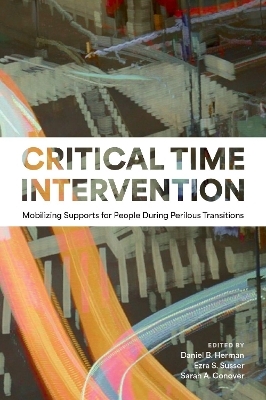
Critical Time Intervention
Oxford University Press Inc (Verlag)
978-0-19-751811-3 (ISBN)
- Lieferbar (Termin unbekannt)
- Versandkostenfrei innerhalb Deutschlands
- Auch auf Rechnung
- Verfügbarkeit in der Filiale vor Ort prüfen
- Artikel merken
The book recounts CTI's initial development by a creative team of mental health and social service providers working in large homeless shelters in New York City during the early years of the city's contemporary homelessness crisis, describes the main components of the model, emphasizing how it differs from standard forms of case management, summarizes research evidence supporting the effectiveness of CTI, describes how the model has been adapted for use with different high-need populations in a variety of settings in the US an elsewhere, and considers strategies and challenges related to broader implementation of CTI including workforce training, funding, fidelity assurance, and program drift. It concludes with a consideration of the implications of CTI for the design of new "time-sensitive" intervention models in social work and allied fields.
Daniel Herman is Professor Emeritus and former Associate Dean for Research at the Hunter College Silberman School of Social Work and the Graduate Center of the City University of New York. He previously served on the faculty of Columbia University's Mailman School of Public Health and its Department of Psychiatry. Dr. Herman is the founding director of the Center for the Advancement of Critical Time Intervention which promotes international dissemination of the CTI model. He began his academic career following a dozen years working as a social worker in New York City's public mental health and homeless services systems. Ezra S. Susser is Professor of Epidemiology and Psychiatry at the Mailman School of Public Health at Columbia University, and at New York State Psychiatric Institute. At Columbia University, his roles have included Chair of Epidemiology, Director of the Psychiatric Epidemiology Training Program, and co-founder of the Columbia University Global Mental Health Program. His work includes the initial development and testing of Critical Time Intervention (CTI) to prevent recurrent homelessness, and its adaptation to settings in Latin America, alongside Sarah A. Conover. Under the leadership of Daniel Herman, as well as Sarah A. Conover, he has contributed to the ongoing evolution of CTI in the Center for Advancement of CTI. Sarah A. Conover directs the Global Network of the Center for the Advancement of Critical Time Intervention at Hunter College, which promotes fidelity to the model through collaboration on international adaptations. She co-developed the CTI model while at the New York State Psychiatric Institute, where her focus was on developing and evaluating services for people with schizophrenia who are homeless.
Chapter 1: Daniel B. Herman, Ezra S. Susser, Sarah A. Conover, and Elie Valencia: Specifying and Testing the Critical Time Intervention Model
Chapter 2: Daniel B. Herman, Ezra S. Susser, and Sarah A. Conover: Model Description
Chapter 3: Jennifer I. Manuel, Megan R. Nizza, Daniel B. Herman, Sarah A. Conover, Laura I. Esquivel, Yeqing Yuan, and Ezra S. Susser: Current Evidence and Recommendations for Further Research
Chapter 4: Carolyn Hanesworth and Daniel B. Herman: Critical Time Intervention in Rapid Re-housing
Chapter 5: Jennifer I. Manuel, Khadija Israel, Yeqing Yuan, Laura I. Esquivel, Laura Curran, and Daniel B. Herman: Adapting Critical Time Intervention for Residential Substance Use Treatment
Chapter 6: Stacey Barrenger, Liat S. Kriegel, and Beth Angell: Critical Time Intervention in Criminal Legal Settings
Chapter 7: Rufina J. Lee and Ilana R. Nossel: Critical Time Intervention With Persons Experiencing First-Episode Psychosis
Chapter 8: Helle Thorning, Martin Sandø, René de Vet, Danielle Lako, Alex Smith, and Judith Wolf: Critical Time Intervention in European Countries
Chapter 9: Franco Mascayano, Sarah A. Conover, and Ezra S. Susser: Critical Time Intervention Task-Shifting for People with Psychoses in Latin America
Chapter 10: Daniel B. Herman, Sarah A. Conover, and Ezra S. Susser: Model Diffusion and Current Developments
Chapter 11: Daniel B. Herman, Sarah A. Conover, and Ezra S. Susser: Selected Issues for the Next Decade
Chapter 12: James M. Mandiberg, Daniel B. Herman, and Ezra S. Susser: Toward a Conceptual Framework for Critical and Time-Sensitive Interventions
| Erscheinungsdatum | 07.10.2024 |
|---|---|
| Verlagsort | New York |
| Sprache | englisch |
| Maße | 163 x 239 mm |
| Gewicht | 408 g |
| Themenwelt | Recht / Steuern ► EU / Internationales Recht |
| Recht / Steuern ► Privatrecht / Bürgerliches Recht ► Berufs-/Gebührenrecht | |
| Sozialwissenschaften ► Pädagogik ► Sozialpädagogik | |
| Sozialwissenschaften ► Soziologie | |
| ISBN-10 | 0-19-751811-7 / 0197518117 |
| ISBN-13 | 978-0-19-751811-3 / 9780197518113 |
| Zustand | Neuware |
| Informationen gemäß Produktsicherheitsverordnung (GPSR) | |
| Haben Sie eine Frage zum Produkt? |
aus dem Bereich


